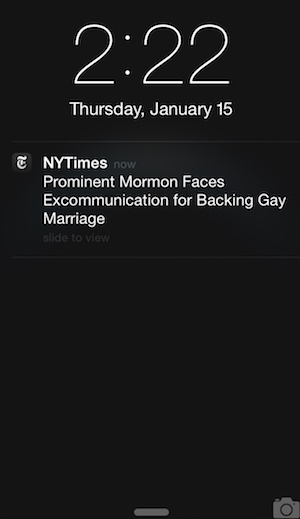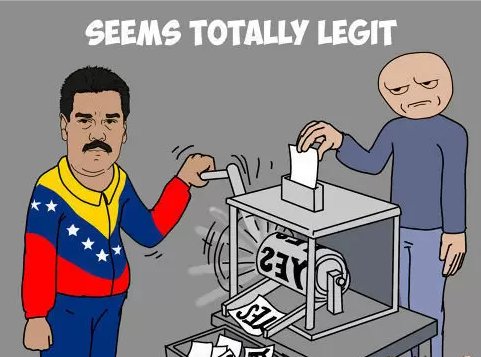Nathaniel Givens’ latest article on John Dehlin just went live on Meridian Magazine’s website. Â While it’s unlikely responding to Givens will do much to alter the opinions of those already decided on this matter, I realized as I read his article that I wasn’t reading it how most Meridian Magazine readers might read it. Â So, here are my thoughts as I read his article.
First, his opening line is a winner:
“Excommunication is always evidence of deep spiritual tragedy.”
Givens asserts a truth that is both impossible to prove and ambiguous enough that he could weasel out of the claim if someone tries to pin him down on it. Â Whenever someone writes, “X is always Y,” I immediately want to come up with an exception. Â In this case, I think there are likely lots of exceptions: For many people who are excommunicated on the grounds of apostasy, they probably don’t consider themselves “spiritual tragedies”. Â Many of these people changed their views about Mormonism or believe Mormonism has changed. Â Thus, from their perspective, their excommunication wasn’t a spiritual tragedy. Â If there is a spiritual tragedy involved, it’s the Church that is experiencing one, not them.
Of course, Givens would likely weasel out of this interpretation of his statement and argue that the spiritual tragedy is the loss of that person’s spiritual blessings. Â In other words, from the perspective of the devout, faithful Mormon, everyone who is excommunicated is losing the chance for godhood, so the devout, faithful Mormon sees this as a tragedy, regardless of how the person who is excommunicated sees it. Â Which, therefore, makes this statement true, because, like the entire article, it’s all about maintaining a faithful perspective with absolutely no regard for what anyone else might think or believe.
Most importantly, I think an enterprising former Mormon needs to create a “spiritual tragedy” badge (both analog and digital) that people who have been excommunicated from the LDS Church can proudly display. Something like this would work:
Givens follows up his opening line with an excuse for why he is going to hatchet John Dehlin:
“For this and many other sound reasons, formal charges of apostasy should never be treated lightly or tried in the court of public opinion. John Dehlin’s decision to make his own disciplinary council public has moved the issue onto a national stage, however. It is still not appropriate for us to speculate or advocate about the outcome of the disciplinary council, but it would be unfair for Dehlin to take the story national—with implications for the Church to which we all belong—and then expect every other Mormon to acquiesce to his version.”
Translation:
This is supposed to be a private matter, but I need an excuse to attack John Dehlin. Â So, since he made it public, I have every right to go public, too. Â Forget that whole “Turn the other cheek” or “Do unto others” crap Jesus taught. Â John’s a public figure, so I’m going to attack him publicly and I don’t feel guilty doing so because I don’t actually have a moral conscience. I have a Mormon conscience, which is way, way better.
The next section says John is making money off of Mormon stories, as though that is some how immoral (like, maybe, charging people to enter temples or get baptized).
Givens then notes that John Dehlin has interviewed faithful Mormons and “hostile critics,” like this person:
Givens then labels John a “critic” of the Church. Â I’ll give him credit for at least not calling John an anti-Mormon, which is probably the term Givens would prefer to use (and uses for some of the people John associates with), but hopefully we’re past claiming that anyone who disagrees with the LDS Church wants to kill Mormons. Â Calling John a critic is an effort to discredit John by poisoning the well. Â But, you know what, I don’t really care on this point. Â John is a critic of the LDS Church, as is anyone else who has ever said, “Hey, wait a minute. Â The LDS Church leaders just did what?” Â The second you question anything in the LDS Church, you’re now a critic, because that’s all it takes to be critical of an institution – questioning it. Â So, props to John for being publicly labeled a critic – he joins the ranks of many other well-respected critics of the LDS Church!
Givens then moves to the real meat of his argument: John Dehlin has claimed that among the reasons why he is being excommunicated is because of his support for Ordain Women and same-sex marriage. Â In fact, it’s this part that really gets Givens because the NYTimes picked this part up and ran with it, sending a breaking news text to millions of people that said, “Prominent Mormon Faces Excommunication for Backing Gay Marriage.”
Why is it that Nathaniel Givens doesn’t want to admit that John Dehlin’s excommunication may be rooted in his support of same-sex marriage and Ordain Women? Â Oh, right, because if it is true, then it makes the LDS Church look bigoted, archaic, and hateful. Â Givens tries to argue that these issues aren’t core to the excommunication,
“Among the concerns King felt were most important, gay rights and same sex marriage are not mentioned in any way, and female ordination is at most implied tangentially by point #3 (although that is far from certain).”
Givens then points out that John Dehlin has been inconsistent in emphasizing how central his support for same-sex marriage and Ordain Women have been to his disciplinary council. Â Yeah, that’s kind of true. Â It’s not entirely clear how central they are. Â Are his support for same-sex marriage and Ordain Women 10% of the reason for the disciplinary council? Â 50%? Â 80%? Â 100%?
The actual answer is: the only people who know what percentage of the disciplinary council is based on John Dehlin’s public support for same-sex marriage and Ordain Women are those who called or arranged the disciplinary council (i.e., his Stake President and, in all likelihood, some people at Church headquarters – no one believes they aren’t involved since this is too high profile of a case). Â John Dehlin doesn’t even know, because disciplinary council’s are basically opaque. Â Disciplinary councils are basically like military tribunals or federal criminal court cases where the evidence against the accused is classified as confidential.
The only people who get to see it are the prosecutors and the judge (or panel of judges). Â Everyone else basically just hears, “He engaged in espionage” or “He stole state secrets” but we don’t ever get to find out exactly what happened, because the government doesn’t have to reveal it. Â And that is what happens in disciplinary courts: We have no idea: (1) Who started the process against John; (2) What the actual reasons for this are; (3) and Who is actually running the show. Â Why? Â Because the Church doesn’t have to do that and its members are too sheepish to call them out on this. Â If the process were confidential to protect John’s interests, that would make sense. Â I can understand this in the case of someone who had an affair or did something else that might tarnish their reputation. Â But, in John’s case, what he did isn’t tarnishing his reputation; it’s tarnishing the Church’s reputation. Â That’s also why the Church has a caveat in the Church Handbook of Instructions that says no one is supposed to record disciplinary councils – not to protect the accused, but to protect the Church. Â They don’t want a record of what the actual reasons are for the disciplinary council, because that would make them look bad. Â Really bad. Â Instead, they keep it all hush hush and then let their apologetic minions do all the necessary work to attack critics of the Church for them. Â This way, the Church’s hands look clean, even though, when you make them take off their gloves, they are nasty.
So, we don’t know whether or not John’s support for same-sex marriage or Ordain Women is 10% or 90% of the reason for the disciplinary council. Â But Givens then turns to John’s stated beliefs and practices, noting that John has admitted he isn’t sure he accepts everything. Â Givens then claims that the key here is that John is a public figure. Â So, John isn’t really allowed to state his doubts or raise concerns because he has a public following. Â He even notes that this is why he thinks John has crossed the line,
“It is one thing to disbelieve privately. It is another thing to disbelieve publicly, and with a very large following. And it is yet another to act openly in accord with this disbelief, and to evangelize others to share that rejection of Church teachings. It is in that last instance in particular that Church leaders may have considered that Dehlin crossed a crucial line.”
In other words, Givens thinks it’s wrong to openly disbelieve in teachings of the Church, particularly if you are well-known and have lots of followers on social media.
Wait!
Hold on!
Givens thinks it’s wrong to openly express disbelief! Â Isn’t this the equivalent of saying, “If you have questions, keep them to yourself!” Â Or, “It’s fine if you don’t believe everything so long as you never tell anyone.” Â What is Givens really saying? Â He’s saying that anyone who questions Mormon teachings is a threat to those who don’t. Â Publicly expressing questions or “disbelief” threatens to pop Givens’s Mormon bubble. Â Popping the Mormon bubble might just make other Mormons question. Â And questioning is bad!
Believing is good!
Doubting is bad!
Letting the prophet and apostles think for you is good!
Thinking for yourself is bad!
For Givens, then, it’s much more acceptable to kick someone out of the LDS Church because they have admitted they don’t believe everything and that may allow other people to think for themselves than it is to kick them out for supporting equality publicly. Â Hmm… Â From my perspective, any institution that would consider kicking someone out for doing either of those isn’t an institution worthy of respect. Â It’s an institution that doesn’t allow freedom of speech, freedom of conscience, or freedom of association. Â It’s an authoritarian dictatorship.
Givens concludes that he is clearly right,
“An objective observer would reasonably infer that King is concerned that Dehlin is using his position of prominence in order to undermine the Church and its mission and in so doing has placed his affiliation with the Church in jeopardy. That, at least, seems a plain and reasonable interpretation of the public record.”
The irony, of course, is that Givens is anything but an “objective observer”. Â Givens has a leg in this game – he’s a believer and an apologist, trying to defend his religion’s efforts to control what the members say and do publicly. Â Givens isn’t objective and is about as far away from being able to think objectively about this as is possible.
Finally, Givens ends with this absurd statement,
“There may be personal motives and considerations that further amplify or ameliorate the alleged offenses. They are—and should be—beyond the purview of a treatment like this one. But the details outlined above based on publicly available sources are sufficient to correct media reports that an individual is being sanctioned for following his conscience, or for holding particular personal beliefs.”
To Givens, John Dehlin isn’t being sanctioned for what he believes or does. Â He’s being sanctioned for hurting the Church. Â Never mind that those may be (though arguably are not) the same thing. Â John is following his conscience, both in his support for Ordain Women and same-sex marriage, and in his disbelief. Â Givens just thinks that it’s dangerous to ask questions and publicly express disbelief, because it might pop someone’s protective bubble.

So, he prioritizes protecting blind faith over thinking, and ends up concluding that Dehlin is being sanctioned for making it easier for people to ask questions, but instead frames it as John being a threat to the Church. Â John IS a threat, because people need to threaten authoritarian dictatorships.
Don’t get me wrong. Â I think Nathaniel Givens genuinely believes that the Church is going after John because he is a threat. Â But Givens also can’t see the reality behind why John is a threat – because John might make people question. Â Because Givens likely believes that the Church can do no wrong (it can’t, or would why he do so much for it?), this is about what John Dehlin did that was wrong and the Church defending itself, not the Church victimizing John Dehlin for expressing his conscience. Â Givens has to defend his religion to defend himself. Â As a result, he can’t see what the Church is really doing. Â He can only see what he wants the Church to be doing.
At the end of the day, Givens is putting the continued existence of an institution ahead of what may be best for its members. Â And that is sad….









I think this is the crux of it. John Dehlin has apparently been open with what information they’ve given him. But since the CoJCoL-dS won’t even tell the accused precisely what the charges and evidence against him are, their claim that this secrecy is to protect the accused’s privacy doesn’t hold water.
Givens is right that since John Dehlin chose to take this public, he should expect public discussion of it — including discussion that is critical of him. But Givens can’t offer anything but idle speculation on this case since he has even less info than Dehlin.
Also, isn’t Meridian owned by the CoJCoL-dS?
So they won’t state the charges against JD out of respect for his privacy, yet they have no problem paying someone to write a bunch of armchair speculations about his motives…?
“Excommunication is always evidence of deep spiritual tragedy.”
I just finished teaching my students that a claim can only be a claim if it has qualifiers that make it arguable and not a fact. So clearly he’s not interested in any counterclaims, which from the start weakens the piece.
With that said, he likens Dehlin to Kelly, but then suggests that it’s not about Dehlin’s positions on public issues (like gay rights), but a general rule of excommunicating “unrepentant predators and hostile apostates.” The whole thing just seems muddy. They’re either going to press the “you might be a believer, but you’re too feisty” button (which they pressed for Kelly), or the “you’re not a believer after all, and are just treating the Church as your cash cow” button.
I think the story has two purposes.
First, if you doubt stay quiet, stay isolated.
Second, keep the focus on John’s character and the process being fair and respectful. Keep the focus away from what John has publicly stated, reasoned and argued over the last number of years.
I just hope Dehlin finds a way to record the proceedings.
Will he be able to take in witnesses? Will they all be searched for devices?
@4 That’s a good point — they definitely want to avoid giving more publicity to John’s specific points about the CoJCoL-dS, so they want to keep the focus on his character and motives.
@5 That would be awesome!
Speaking of the “real reason,” Dehlin says this post offers it — or is at least how he would respond: the Church, the Information age, and Mormon Stories.